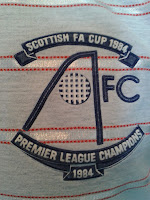 |
| JT with a water bottle-Madrid style! |
A recent trip with the Scottish women's rugby team took @SpaceClinics physio Jon "JT" Twynham to Madrid for a 12 day World Cup qualifying tournament. With local temperatures peaking at 29C, heat and hydration were hot topics in the medical camp.
Furthermore an increasing number of our patients at Space Clinics are opting for sporting events such as marathons and triathlons in warmer foreign climates. Understandable as the Scottish summer has not exactly been a memorable affair the last few years!
" I was hiking up to the famed Yosemite falls in California with a friend, when we bumped into a Russian student, studying in the USA, who was hiking alone. Her American friend had refused to continue on the hike because the Russian student was not drinking 'enough' water. She explained that back home they were taught to make sure they were well hydrated before sporting activity or in this case hiking and that they would not require large amounts of water during activity even in the height of the Californian summer. I didn't totally agree with her logic, but she seemed perfectly fine so we all hiked on together with no dramas."
This might be the perfect opportunity to address the topics of heat and dehydration currently doing the rounds of the Medical and scientific world following popular blogs in April 2012 on the subject for ultra runners (SPACE Blog: 23.04.12 Fluid intake in ultra runners and in marathon runners (SPACE Blog 20.04.12 Water Stations in marathons).
As the air temperature rises it becomes harder for excessive body heat to radiate through the skin. This can lead to an accumulation of heat in the body causing a rise in core temperature. If this temperature reaches 41C then the individual will suffer from heat stroke, which can cause altered mental state, collapse and unconsciousness. Luckily the body has an in built mechanism to help combat this, namely sweating, which massively increases the ability to evaporate heat and increase heat loss. When heat accumulation does occur we either need to step up the heat loss or slow down the heat production. Hence marathon times in the heat tend to be slower.
Given the sweat response it seems logical that as we sweat more we must drink more to prevent dehydration. Severe dehydration can be detrimental to health and performance, but there is common misconception that you need to drink as much as you can. Before we continue to discuss hydration it is pertinent to be aware of a medical condition called hyponatremia. This condition is caused by a decrease in the sodium concentration in the blood and can lead to unconsciousness and even prove fatal. The main cause of hyponatremia is the excessive consumption of fluids, this tends to occur during endurance events, such as marathons and long distance triathlons.
In fact in the 2002 Boston marathon 13% of all the finishers were clinically hyponatremic.
In fact in the 2002 Boston marathon 13% of all the finishers were clinically hyponatremic.
To become hyponatremic you need to consume more than 750ml of fluid an hour for more than 4 hours. This means sub 3.30hrs marathon runners would not be at risk as they just don’t have time to drink that amount of water, but with water stops now so frequently available at most events the plus 4 hour athletes need to be careful.
So where does this leave us with drinking during prolonged exercise? How do we know how much to drink? The sports drink industry has been fairly vocal in telling us to drink, drink, drink.
Luckily our body has another amazing function to help us with this: Thirst!
That is if you are thirsty you need to drink and not before, but the notion that "by the time you are thirsty you are already dehydrated" is what we are led to believe.
Studies have shown that elite marathon runners who only drink in response to thirst perform better than those who drink more regularly. In fact elite marathon runners can lose up to 10% of their body weight in a race with no affect on their performance.
As JT concludes wisely, “it seems like my Russian acquaintance was not far off the mark nearly 10 years ago.”
Our take home message is drink to thirst and don’t confuse being hot with needing to drink.
Cool yourself, don't drown yourself from the inside.

